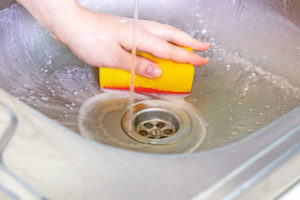
It can be tempting to pour hot grease or oil in a drain, rinse and wash the pan, and be done with it but this is the worst possible option. This is a common source of plumbing issues. While assuming that the hot water that follows this grease down the drain will take care of the issue, grease can cause damage to pipes, drainage systems, and the overall sewage system.
Why is Grease Bad for Your Pipes?
The long and short of it is that fats, oils, and grease (FOG) cause blockages when they are poured down the drain. It can cause damage to sewage systems by building up, thickening, and combining with other oil particles in pipes creating full or partial blockages. Many people assume this means meat fats but common FOG put down kitchen drains are butter, vegetable oil, shortening, sauces, and salad dressings. These materials, if they build-up can cause what is called “fatbergs.” Fatbergs can stop water flow through your home or simply prevent pipes from draining properly.
Beyond the House Pipes
The more grease that builds up, the harder it is to remove. Once the FOG or fatberg ends up in your drainage system it can be damaging to drainage as well as cause sewage backups and even ruptures. This alone can cause environmental impacts. Untreated or partially treated sewage can be set free to make its way back to the natural water supply. This can cause drinking water to be contaminated. This can also cause water to deplete oxygen which can lead to killing off waterfowl and aquatic life.
How to Dispose of Grease and Cooking Oil
Since you shouldn’t not be dumping FOG down the drain under any circumstance, how do you get rid of it? It’s easier than you might think.
For grease, let it harden and then scrape it into a disposable container. For extra protection from leakage, place that container in a bag. Avoid running water over your greasy pans. Instead, use a paper towel to remove what is left in the dish and throw that away as well.
For cooking oil, there are a few options. First, let it cool, no matter which option you choose. To discard the oil, pour the cooled oil over paper towels in the trash bin. If you have not heated it past the smoke point and want to reuse the oil, pour it into a resealable container to use for later. The last option is to recycle the oil. Local collections are available and will keep the oil out of landfills.
What if You Pour Your Grease Down the Drain
If you’ve accidentally poured the FOG in the drain your best option is to call a trusted plumber. Myths are surrounding how to clean oil from pipes but they are just that: myths. The first myth is that garbage disposals take care of grease that is dumped down the drain. Garbage disposals are not meant for FOG. FOG can decrease the effectiveness of your disposal blades over time. The second myth is that hot water with dish soap will take care of the oil/grease. This can help dislodge the grease but this only pushes the material further down the drainage system. The third myth is that boiling water down the drain behind the FOG will solve the issue. This has the same outcome as the second myth, it only moved the material around. The final myth is that it is not harmful to pour cooking oil down the drain because it is not solid. Oil coats pipes and can cause blockages even after being flushed with water. They still pose a threat to your pipes and drainage system.
All of Your Plumbing Needs from Master Plumbing
Give Master Plumbing a call at (301) 650-9100, or contact us online to get more information on how our expert plumbers can help you with just about anything plumbing-related! We have received Angie’s List Super Service Award recognition for plumbing and drain cleaning every year since 2007, in addition to the Best Plumber award from Best of Bethesda. We are fully licensed, bonded, and insured, and our service is unparalleled. Give us a call today—you won’t regret it! To see examples of our projects, follow us on Facebook and Twitter!
